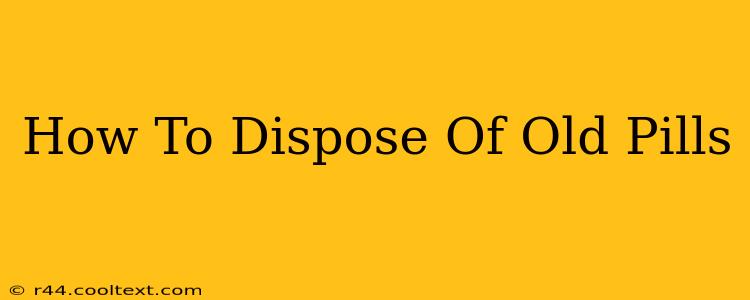Properly disposing of old or expired medications is crucial for protecting your family, pets, and the environment. Improper disposal can lead to accidental poisoning, water contamination, and misuse of drugs. This comprehensive guide will walk you through safe and effective methods for disposing of your unwanted pills.
Why Proper Disposal Matters
Accidental Ingestion: Old medications left lying around pose a significant risk, especially to children and pets who might mistake them for candy. Even seemingly harmless medications can have dangerous consequences if ingested accidentally.
Environmental Impact: Flushing medications down the toilet or throwing them in the trash contaminates our water systems and landfills. These chemicals can harm wildlife and ultimately impact human health.
Medication Misuse and Abuse: Improperly disposed-of pills can fall into the wrong hands, contributing to the opioid crisis and other forms of drug abuse.
Safe Disposal Methods: A Step-by-Step Guide
The best method for disposing of your old pills depends on the type of medication and your location. Here are some reliable options:
1. Medication Take-Back Programs
Many pharmacies and law enforcement agencies participate in medication take-back programs. These programs offer a safe and convenient way to dispose of unwanted medications, including controlled substances. You can typically drop off your pills during specific hours or events. Search online for "medication take-back program near me" to find a location in your area. This is often the best option for controlled substances and other potentially dangerous medications.
2. Using a Home Disposal Method (For Non-Controlled Substances)
For non-controlled substances, the FDA recommends mixing medications with undesirable substances like kitty litter or used coffee grounds. This makes them less appealing and harder to extract. Seal the mixture in a sealed bag or container and throw it in the trash.
Step-by-Step:
- Gather your unwanted medications.
- Mix them with an undesirable substance (kitty litter, coffee grounds, etc.).
- Place the mixture in a sealed, opaque bag or container. This prevents accidental ingestion and keeps the medications from leaking.
- Throw the sealed container in the regular trash.
3. Check Your Medication's Packaging
Some medications come with instructions for disposal printed directly on the packaging. Always check the label for specific disposal recommendations.
4. Contact Your Pharmacist
If you are unsure about the best disposal method for a particular medication, contact your pharmacist for guidance. They are a valuable resource and can provide specific instructions tailored to your situation.
Things to Avoid:
- Flushing medications down the toilet: This contaminates water sources.
- Throwing pills directly in the trash: This makes them easily accessible.
Frequently Asked Questions (FAQs)
Q: What should I do with liquid medications?
A: For liquid medications, follow the instructions on the label or contact your pharmacist. Some liquid medications may require special handling.
Q: How often are medication take-back events held?
A: The frequency of medication take-back events varies by location. Check your local health department or law enforcement agency website for scheduling information.
Q: What if I have a large quantity of medications to dispose of?
A: Contact your local health department or law enforcement agency for guidance on handling larger quantities of medications. They may have specific procedures or resources available to assist you.
By following these guidelines, you can ensure the safe and responsible disposal of old and unwanted medications, protecting your family, community, and the environment. Remember, responsible disposal is a crucial step in preventing accidental poisoning, medication abuse, and environmental contamination.

